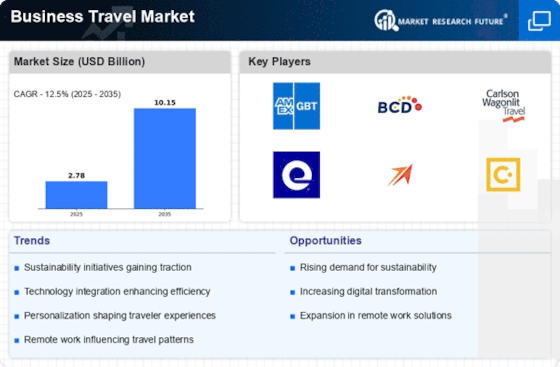Top Industry Leaders in the Business Travel Market
*Disclaimer: List of key companies in no particular order
Top listed global companies in the business travel industry are:
ADEKA CORPORATION Airbnb, Inc.
American Express Company
BCD Group
Booking Holdings
CWT Solutions
Corporate Travel Management
Expedia, Inc.
Fareportal
Flight Centre Travel Group Limited
Wexas Travel
Hogg Robinson Ltd
Priceline
Egencia LLC
Frosch International Travel
Ovation Travel Group
Travel Leaders Group
Bridging the Gap by Exploring Top Leaders Competitive Landscape of the business travel Market
The business travel market is a dynamic arena where established giants and nimble startups clash for dominance. This landscape is characterized by a diverse set of players, each vying for a slice of the pie through distinct strategies and target segments. Let's delve into the competitive panorama, analyzing key player strategies, market share drivers, emerging trends, and the overall scenario.
Giants of the Game:
- Traditional Travel Management Companies (TMCs): These industry veterans like BCD Travel and American Express Global Business Travel boast extensive networks, corporate partnerships, and robust negotiation power with airlines and hotels. Their focus lies on cost control, compliance, and travel program optimization for large corporations.
- Online Booking Platforms (OBPs): Expedia and Booking.com have leveraged their digital prowess and vast inventories to disrupt the market. They offer convenience, competitive pricing, and user-friendly interfaces, attracting small and medium-sized businesses (SMBs) and cost-conscious travelers.
- Airlines and Hotel Chains: Major carriers like Lufthansa and Marriott International are increasingly playing dual roles, acting as both suppliers and distributors. They leverage loyalty programs, corporate deals, and bundled packages to attract travelers and secure market share.
Beyond the Big Boys:
- Technology-Driven Startups: New entrants like TripActions and Rocket Travel are revolutionizing the landscape with AI-powered booking platforms, expense management tools, and data-driven insights. Their focus on personalization, automation, and cost savings resonates with modern, tech-savvy travelers.
- Sustainability-Focused Players: Companies like GreenTheTrip and CHOOOSE are catering to the growing demand for eco-conscious travel. They offer carbon-offsetting programs, sustainable hotel options, and green travel planning tools, attracting environmentally conscious corporations and travelers.
- Niche Players: Niche players like Flight Centre cater to specific segments like SMEs or luxury travel. Their deep understanding of these segments, personalized service, and tailored offerings create distinct competitive advantages.
Market Share Analysis: A Multifaceted Game:
Analyzing market share in the business travel arena requires a nuanced approach. Factors like:
- Geographic Focus: Companies may dominate in specific regions or countries based on network strengths and local partnerships.
- Client Segment: Catering to large corporations, SMBs, or individual travelers requires different strategies and offerings, influencing market share distribution.
- Service Portfolio: Companies offering a comprehensive suite of booking, management, and expense tools might hold an edge over those focusing solely on bookings.
- Technological Innovation: Early adopters of AI, automation, and data analytics can gain significant market share by providing superior user experiences and cost savings.
New Frontiers: Trends Shaping the Landscape:
The business travel landscape is constantly evolving, driven by emerging trends:
- Bleisure: The blurring lines between business and leisure travel create opportunities for flexible booking platforms and loyalty programs that cater to both work and personal needs.
- Sustainability: Eco-conscious travel is becoming a priority, driving demand for green travel options and carbon-neutral solutions.
- Hyper-Personalization: AI-powered platforms are personalizing travel experiences, recommending destinations, flights, and hotels based on individual preferences and travel history.
- Remote Work: The rise of remote work is impacting travel patterns, leading to increased demand for flexible travel policies and decentralized travel management solutions.
The Competitive Outlook: A Dynamic Ecosystem:
The business travel market is a dynamic ecosystem with established players facing pressure from nimble startups and niche specialists. Success in this competitive arena hinges on:
- Adaptability: Embracing new technologies, trends, and changing travel patterns is crucial to stay ahead of the curve.
- Focus on Value: Providing tangible cost savings, efficiency gains, and personalized experiences will differentiate winners.
- Strategic Partnerships: Collaborations with airlines, hotels, and technology providers can unlock new opportunities and expand reach.
- Sustainability Integration: Addressing the growing demand for eco-conscious travel is no longer optional, but a competitive necessity.
The business travel market is a vibrant and competitive landscape. Understanding the key players, market share drivers, and emerging trends is crucial for navigating this dynamic ecosystem. Those who adapt, innovate, and prioritize value creation will be best positioned to thrive in this exciting and ever-evolving arena.
Latest Company Updates:
Airbnb, Inc.:
- Launched Airbnb for Work platform catering to business travelers with enhanced features like expense reporting and flexible cancellation policies. (Source: Airbnb press release, October 26, 2023)
American Express Company:
- Launched Amex Meetings & Events, a new platform for corporate travel and event planning. (Source: American Express press release, November 17, 2023)
BCD Group:
- Acquired Travel Management Company, expanding its presence in the North American market. (Source: BCD Group press release, December 12, 2023)
Corporate Travel Management:
- Focuses on the mid-market travel segment with its personalized service and technology solutions. (Source: CTM website)

